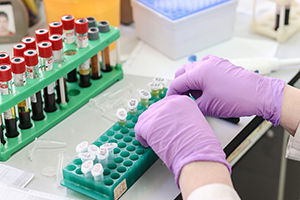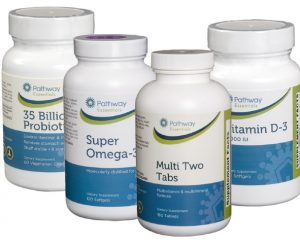5 Strategies for Supporting Mental Wellness

5 Strategies for Supporting Mental Wellness
- Optimize Your Diet
- Support Your Gut-Brain Connection
- Adopt Healthy Lifestyle Habits
- Order Functional Lab Testing
- Supplement with Targeted Nutrients
1. Optimize Your Diet

Statistics show that most Americans fall short on getting all of the nutrients that their bodies require for optimal health. And, during times of stress, there is an even greater need for vitamins and minerals to help ensure that the body meets its enhanced demand for energy, oxygen and circulation. Research shows that nutrition status is linked to the onset as well as the severity and duration of depression. Deficiencies and/or imbalances in essential vitamins, minerals, amino acids, omega-3 essential fatty acids and beneficial bacteria have been found to be prevalent in individuals suffering from mental disorders.
In addition to nutrient deficiencies, depression and mental health disorders are also characterized by chronic, low-grade inflammation and oxidative stress. Therefore, eating an anti-inflammatory, nutrient-dense diet is highly recommended. The Mediterranean diet (rich in vegetables, fruits, whole grains, healthy fats and lean protein) has been shown to help reduce one’s risk for depression, as compared to the typical “Western diet.” Eating a highly processed diet containing a lot of sweetened desserts, fried food, processed meat, refined grains and high-fat dairy products is associated with a greater risk of developing depression.
Healthy foods provide the body with nutrient building blocks necessary for optimal brain function and neurotransmitter production. Some of the most important nutrients that have been shown to play a role in depressive disorders include folate, iron, long-chain omega-3 fatty acids (EPA and DHA), magnesium, potassium, selenium, thiamine, vitamin A, vitamin B6, vitamin B12, vitamin C and zinc. A whole-foods diet can help to improve your overall health and promote mental well-being. Even small changes have been shown to make a big difference. Listed below are some of the best foods that provide mood boosting nutrients.
Top Mood Boosting Foods
• Vegetables and fruits, such as dark leafy greens, cruciferous vegetables (broccoli, kale, cauliflower, cabbage, etc.), lettuces, peppers, fresh herbs and berries contain a wide variety of important nutrients including vitamins, minerals and antioxidants. They are also rich in fiber and promote healthy GI function.
• High-quality protein, such as grass fed beef, organic chicken, wild fish, free-range eggs, bone broth and legumes provide vitamins, minerals and amino acids that are necessary for supporting the structure and function of your brain. Amino acids in particular help to produce key neurotransmitters needed for healthy mood balance.
• Healthy fats, including omega-3 rich foods such as avocados, grass-fed butter, olive oil, walnuts, flaxseeds and fish have anti-inflammatory properties and support healthy brain function and neurotransmission.
• Probiotic-rich foods, such as kefir, yogurt, kombucha, miso and fermented vegetables provide beneficial bacteria that have been shown to have many positive effects on the body. Via direct and indirect pathways, probiotics and the gut microbiome influence brain health and play an important role in promoting mental well-being.
2. Support Your Gut-Brain Connection

Your gut and brain are in constant communication. Known as the gut-brain axis, this connection has become an exciting area of emerging research relating to mental health. The digestive system, also called the “second brain,” contains millions of nerve cells and immune cells and produces many important neurotransmitters including serotonin, norepinephrine, epinephrine and dopamine. The gut also houses trillions of microorganisms that provide nutrients and communicate with the immune, endocrine and the central nervous system by producing metabolites that affect the body’s neurotransmitters. Via the gut-brain connection, the composition and diversity of the microbiome is believed to play an important role influencing mood and behavior.
Several studies have shown that individuals with depression, bipolar disorder and other mood and psychiatric disorders have significant differences in the composition of their gut microbiome as compared to healthy individuals. It is suggested that gut dysbiosis, intestinal permeability and inflammation activate the body’s immune system and stress response, and are risk factors for mental illness. Addressing gut health by enhancing beneficial bacteria with prebiotics, probiotics and dietary changes may have a powerful potential for improving mood and anxiety.
5 Ways to Support a Healthy Gut-Brain Connection
1. Eat polyphenol-rich foods, such as berries, spinach, broccoli, cocoa powder, dark chocolate and walnuts. Eating these foods has been shown to have beneficial effects on cognitive function via gut bacteria. Polyphenols act as prebiotics (food for beneficial bacteria) and help to enhance the growth of healthy bacteria, and they also help to protect neurons against injury and have anti-inflammatory benefits.
2. Eat foods that promote a healthy and diverse microbiome, including fiber-rich prebiotic foods (such as garlic, onions and leeks) and probiotic foods (such as yogurt, sauerkraut and kimchi). And, include foods rich in collagen and amino acids (like bone broth) to support the health of the intestinal lining.
3. Practice deep breathing exercises, meditation or yoga, and try humming, singing, and washing your face with cold water to help stimulate the vagus nerve, which is the body’s major pathway connecting the brain to the digestive system. This helps to stimulate the body’s parasympathic nervous system (opposite of “fight or flight” response), and is associated with better mood, less anxiety and more stress resilience.
4. Exercise daily to help promote healthy gut biodiversity. There are many protective effects of exercise, such as reducing the risk of colon cancer and inflammatory bowel disease, decreasing psychological disorders (anxiety and depression), promoting cognitive function, and improving the body’s stress response.
5. Avoid foods that trigger inflammation, such as refined carbohydrates, sugar, processed foods and foods that you may be sensitive to, such as gluten, dairy, eggs and soy.
3. Adopt Healthy Lifestyle Habits

10 Lifestyle Habits That Promote Mental Wellness
1. Exercise – Jogging, swimming, cycling, walking, gardening and dancing are examples of aerobic exercises that have been found to help reduce anxiety and depression. Exercise increases blood circulation to the brain, benefits the body’s stress response, increases energy, stamina and endurance, improves self-esteem, and provides a healthy distraction.
2. Socialize – Connecting with friends and loved ones has a powerful effect on mental health. Even though we need to be socially distant right now due to COVID-19, it is important that we continue to maintain and build relationships. Having a strong support network can help alleviate emotional distress and improve your ability to cope with stressful situations. Social isolation and loneliness are associated with a greater risk of poor mental health as well as other health problems.
3. Go outside – Being in nature is associated with lower levels of stress, anxiety and depression. Spending time outdoors has also been shown to enhance attention levels as well as feelings of resiliency and restoration.
4. Meditate – Practicing mindfulness can help to ease a racing mind by focusing on the present moment, breath by breath. Mindfulness techniques and relaxation exercises have been shown to have physical benefits as well as emotional and mental benefits, too. Even spending just a few minutes meditating each day can help to cultivate a sense of calmness and inner peace.
5. Laugh – Laughter is a healthy way to manage stress. Laughing has been shown to decrease stress hormones while promoting levels of the feel-good hormones dopamine and serotonin. Laughter also has pain-relieving benefits, supports immune health, eases physical tension, decreases anger, and counteracts distressing emotions.
6. Sleep well – Sleep is closely connected to mental, emotional and physical health. Poor sleep is a risk factor for the development of a range of mental health issues and is linked to a weakened immune system. Sleep disturbances and sleep deprivation can cause emotional instability, trouble concentrating, hormone disruption, heightened stress levels, and can negatively impact one’s coping ability. Adopting healthy sleep habits can help to recharge you and help you recover from physical, mental and emotional exertion.
7. Practice gratitude – Taking a moment cultivate gratitude daily has many benefits. For example, it can help to increase physical and psychological well-being, enhance empathy, reduce aggression, improve self-esteem, increase mental strength, and improve life satisfaction.
8. Get creative – Setting aside time for a creative outlet, such as writing, drawing, journaling, painting or coloring, can allow one to disconnect from stress and express inner thoughts and emotions. Creating art can be a meditative process and can be an effective outlet for releasing tension.
9. Adopt a pet – Animals can provide owners with immense comfort, companionship and motivation. Caring for a pet has many health benefits such as easing feelings of depression and anxiety, lowering stress levels and improving heart health. However, adopting a pet is a serious commitment, so be sure you’re ready for the responsibility.
10. Seek support – Reaching out for professional help can make a real difference in your mental health and well-being. If you find that your emotions are too much to manage on your own, please seek help. No one should struggle alone.
4. Order Functional Lab Testing

3 Key Functional Lab Tests for Mental Health
1. Men’s / Women’s Wellness Panel – These lab panels provide a very comprehensive evaluation of your overall health. They include advanced thyroid testing, blood sugar analysis, inflammation markers, hormone analysis, nutrient testing, plus much more.
2. Brain Chemistry Panel – This test evaluates important biochemical factors that may be impacting mental or emotional health. Based on your test results, an individualized nutrient plan can be recommended to help promote optimal nutrient balance, neurotransmitter synthesis and reduce free-radical oxidative stress.
3. Organic Acids Test (OAT) – This test provides a comprehensive view of the body’s biochemical balance by measuring metabolic byproducts in the urine. It can help to detect an intestinal yeast overgrowth, bacterial imbalances, vitamin, mineral and antioxidant deficiencies, problems with fatty acid metabolism, and neurotransmitter production.
5. Supplement with Targeted Nutrients

Important Supplements for Mental Health
Core supplements, such as a multivitamin, vitamin D, omega-3 essential fatty acids and probiotics, create a solid foundation and help maximize whole body health and vitality. We have combined the four essentials below in a Foundational Support Bundle to offer you extra savings on these very important nutritional supplements.
• Multi Two is a high-quality, hypoallergenic multivitamin formula that provides a wide range of vitamins, minerals and antioxidants in optimal nutrient forms and therapeutic amounts. Take 4 capsules daily with food.
• Vitamin D3 plays many essential roles in the body, including supporting bone, immune, neurological, musculoskeletal, cellular and cardiovascular health. Even though the body can manufacture vitamin D, most Americans are deficient and require supplementation. Take 1 softgel daily with food.
• Super Omega-3 is a molecularly distilled, high-quality fish oil supplement that contains potent concentrations of the omega-3 essential fatty acids EPA and DHA. These healthy fats have anti-inflammatory properties and play an important role in promoting brain function and supporting mental health. Take 2 softgels daily with food.
• 35 Billion Probiotic is a high-potency probiotic formula that features eight clinically studied strains of beneficial bacteria to support microbiome health. Take 1 capsule daily with food.
Additional Support
In addition to the foundational supplements recommended above, consider taking one or more of these helpful products listed below. These supplements contain ingredients that have been clinically studied and shown to promote nervous system health and mental well-being.
• Magnesium is an important mineral that many people are often deficient in. Evidence shows a correlation between low levels of magnesium and depressive symptoms. Magnesium supplementation can help to ease anxiety and stress-related symptoms. Take 1 capsule three times daily with food.
• Turmeric Extract, which provides the active compound curcumin, is well known for having potent anti-inflammatory properties. Emerging research shows that it can also help with inflammation that is related to mood disorders. Curcumin has been shown to provide relief from anxiety and depressive symptoms, as well as help protect the brain from the harmful effects of stress. Take 1 capsule twice daily.
• Adrenal Support is a nutrient, amino acid and herbal formula designed to provide comprehensive support during chronic stress. This blend of ingredients helps to promote healthy hormone and neurotransmitter balance, as well as support immune function and resiliency. Take 2 capsules daily.
Comprehensive Support for Mental Health
Eating an anti-inflammatory diet, supporting GI health, engaging in healthy lifestyle habits, ordering lab testing, and taking nutritional supplements all work together to promote and maintain mental wellness. Don’t be discouraged if you can’t tackle everything at once! Take small steps to make healthy changes in your life, and your physical and mental health will be rewarded over time. And, while it can be scary to reach out for help, it can be such an important step for your health and well-being. If you’d like further information, Village Green Apothecary’s team of nutrition experts is here to answer your health questions and provide you with personalized guidance.
Feel free to call us, send us an email, come in and visit, or schedule an appointment to receive one-on-one support.
Photos from here, here, here, here and here, with thanks.
Categories
Categories
Humanized Health - NEW!
Learn about personalized health from top experts! Check out our fascinating new shows every week, available as videos, podcasts and transcripts.:
Our Bloggers
-
 Paula Gallagher
Paula Gallagher
Paula is a highly qualified and experienced nutrition counselor on the staff at Village Green.
read more.. -
 Margo Gladding
Margo Gladding
Margo's impressive knowledge base is the result of a unique blend of educational and professional experience.
read more.. -
 Dr. Neal Barnard
Dr. Neal Barnard
Dr. Barnard leads programs advocating for preventive medicine, good nutrition, and higher ethical standards in research.
read more.. -
 Dr. Joseph Pizzorno
Dr. Joseph Pizzorno
Dr. Joseph Pizzorno, ND is a pioneer of integrative medicine and a leading authority on science-based natural medicine.
read more.. -
 Debi Silber
Debi Silber
Debi is a registered dietitian with a master’s degree in nutrition, a personal trainer, and whole health coach.
read more..
SEE ALL OF OUR BLOGGERS


Village Green Apothecary
5415 W Cedar Ln
Bethesda, Maryland, 20814
(301) 530-0800
Toll Free: (800) 869-9159
The information provided on this site is not intended to be a substitute for advice or treatment from a qualified physician, nor is it intended to diagnose or treat a health problem or disease. Consult your physician prior to starting any new health program or if you any questions regarding a medical condition.
© 2025 Village Green Apothecary - All Rights Reserved.



